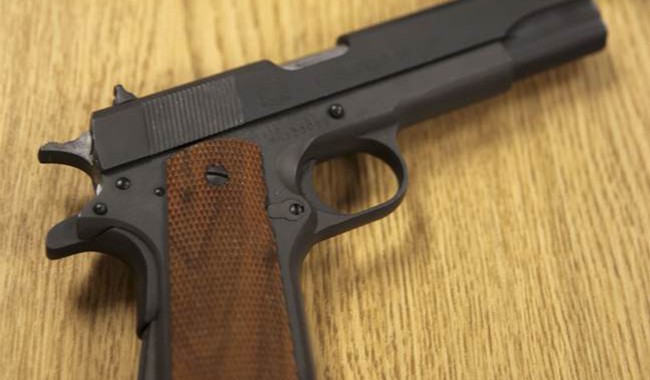A coalition of sixteen Democrat attorneys general, led by New Jersey A.G. Matthew Platkin, are suing the Trump administration over the recent settlement with Rare Breed Triggers, claiming the end of the company’s lawsuit over the ATF’s ban on its forced reset triggers will result in a federal agency breaking federal law restricting possession of machine guns.
In a press conference on Monday, Platkin claimed that for decades, the ATF treated forced reset triggers as machine guns, but “in the dark of night” the Trump administration reversed “decades of precedence” by not only dropping the DOJ’s civil action against Rare Breed, but by agreeing to return about 12,000 forced reset triggers that had been purchased by customers.
Platkin was heavy on histrionics on Monday, accusing Donald Trump of putting gun maker “profits over public safety” and raking in campaign contributions “paid by blood money” from the firearms industry. What Platkin didn’t say was that a federal judge had already granted an injunction in a lawsuit brought by Rare Breed Triggers against the DOJ over the ATF’s policy after finding that the agency “exceeded its statutory authority by expanding definition of machinegun and subsequently classifying FRTs as machineguns.”
In his ruling in July, 2024, U.S. District Judge Reed O’Connor noted that the federal definition of a machine gun is very specific:
[a]ny weapon which shoots, is designed to shoot, or can be readily restored to shoot, automatically more than one shot, without manual reloading, by a single function of the trigger. The term shall also include the frame or receiver of any such weapon, any part designed and intended solely and exclusively, or combination of parts designed and intended, for use in converting a weapon into a machine-gun [sic], and any combination of parts from which a machine-gun [sic] can be assembled if such parts are in the possession or under the control of a person.
A “single function of the trigger” is the key phrase there. As O’Connor wrote, for decades the ATF’s regulations on machine guns mirrored the federal definition. But in 2018 the ATF issued a new regulation on machine guns; one that “broadened the meaning of machinegun by re-interpreting the statutory definition to add the following language:”
For the purposes of this definition, the term “automatically” as it modifies “shoots, is designed to shoot, or can be readily restored to shoot”, means functioning as the result of a self-acting or self-regulating mechanism that allows the firing of multiple rounds through a single function of the trigger, and “single function of the trigger” means a single pull of the trigger and analogous motions. The term “machine gun” includes a bump stock device, i.e. a device that allows a semi-automatic firearm to shoot more than one shot with a single pull of the trigger by harnessing the recoil energy of the semi-automatic firearm to which it is affixed so that the trigger resets and continues firing without additional physical manipulation of the trigger by the shooter.
Three years later the ATF started to apply that definition to forced reset triggers as well as bump stocks, but in June, 2024 the Supreme Court struck down the administrative ban on bump stocks after determining that the ATF exceeded its statutory authority by issuing a rule that classifies a bump stock as a “machinegun”. O’Connor cited that ruling in Cargill v. Garland a month later in striking down the ATF’s rule on FRTs, arguing that forced reset triggers “must reset after every round fired, and a shooter who attempts to prevent the reset by holding the trigger in a fully depressed position will cause the weapon to malfunction.”
In other words, just like bump stocks, FRTs do not allow for more than one shot to be fired from a single function of a trigger.
The Biden administration had appealed O’Connor’s decision, but Attorney General Pam Bondi and other Trump officials decided to settle with Rare Breed instead of continuing to defend the ATF’s rule and how it was applied to the company.
The lawsuit announced today by Platkin and other Democrat attorneys general essentially contends that O’Connor’s decision doesn’t matter, and that the terms of the settlement, at least when it comes to returning seized FRTs, should be disallowed.
There are a couple of glaring issues with that argument. While Platkin and his colleagues maintain that the terms of the settlement means that forced reset triggers will be returned to owners even in states where they’re banned, the settlement itself only says that those items will be returned ““to the extent practicable”, which seems to be an out for the DOJ to keep those FRTs that were purchased by gun owners in states that have banned the devices.
Platkin’s complaint alleges “the Agreement includes no carve outs on its face that would exclude returns to individuals o rentities located in States that bar the possession of FRTs or FRT-equipped firearms. Nor does the Agreement include a carve out excluding returns to individuals who are barred from possessing firearms by federal law pursuant to 18 U.S.C § 922(g), such as convicted felons,” but there’s nothing in the agreement to prevent the DOJ from saying it’s not practical to give FRTs to someone who can’t legally possess or own a firearm, or those that live in states where the devices have been outlawed.
In fact, at this point there’s no indication that any FRTs have yet been returned to their lawful owners, much less purchasers in states like New Jersey or Maryland, where the devices are illegal.
Platkin and the anti-gun AGs are asking a federal court to declare the redistribution policy contained in the settlement to be unlawful, and to “permanently enjoin the Government Defendants from implementing or enforcing the Redistribution Policy beyond that specifically required by another judicial order by returning any FRTs to any individual or entity located in Plaintiff States or to any distributor, dealer, seller, or other entity that sells, resells, or otherwise distributes FRTs into Plaintiff States, either directly or indirectly.”
I’m not an attorney, but I can’t see where Platkin and his colleagues have any standing to sue here. The settlement language gives the DOJ the option to keep FRTs whenever it’s inpracticable to return them to the purchaser, and there’s no sign that any FRTs have been returned to purchasers in states where their possession is illegal under state law. If Platkin could cite specific cases where that has happened then maybe he could convince a judge to modify the terms of the DOJ’s settlement, but as things stand I don’t think there’s any cause for a federal judge in Maryland (where Platkin’s complaint was filed) to intervene.
In fact, this is such a weak lawsuit that I suspect the entire reason it was filed was to give Platkin and others the opportunity to grandstand; declaring Trump is putting the gun industry ahead of little kids, that he’s bathing in the “blood money ” of gun makers, and that he’s somehow doing something illegal by ending the DOJ’s defense of an ATF rule that has already been determined to be a violation of the Administrative Procedures Act.
Bearing Arms contributor John Petrolino was on the press call today, and managed to stump Platkin with an astute question about any historical analogues to a ban on forced reset triggers.
As far as I’m concerned, Platkin’s answer is more evidence that this is both lawfare and political theater. The courts should quickly reject Platkin’s complaint and leave the settlement with Rare Breed Triggers intact.
Read the full article here







![Adam Carolla and Joe Rogan Blast BBC for ‘Cooking’ Trump Speech to Push False Narrative [WATCH] Adam Carolla and Joe Rogan Blast BBC for ‘Cooking’ Trump Speech to Push False Narrative [WATCH]](https://www.boredtrashpanda.com/wp-content/uploads/2025/11/2025.11.15-09.52-boredtrashpanda-69184d5a98102.jpg)


![Reelected Mayor Charged With Felonies for Voting Without Citizenship [WATCH] Reelected Mayor Charged With Felonies for Voting Without Citizenship [WATCH]](https://www.lifezette.com/wp-content/uploads/2025/08/2025.08.02-06.42-lifezette-688e5c27ce923.jpg)

